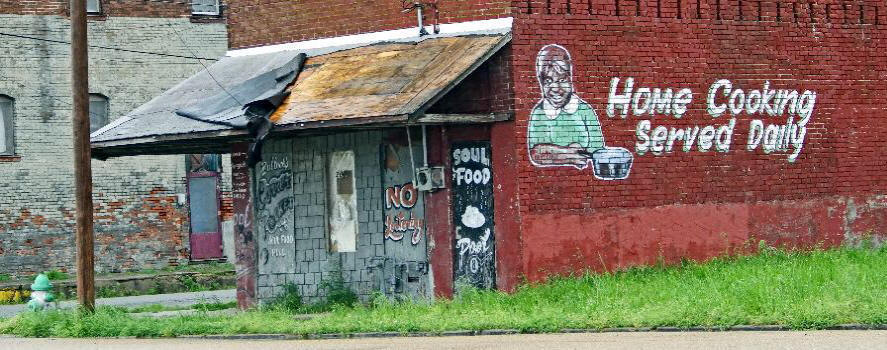
~ Delta Poetry Review ~
Reflections on Saying Goodbye
in the South
The Lightness of Bones
Sunday morning, 9:00 a.m. in an opulent parlor of an art deco funeral
home in New Orleans.
Heavy oil paintings of the men who have made a living off of the dead
stared solemnly at me.
A parking lot full of vehicles told me that despite statements to the
contrary, death does not take a holiday or a Sunday off.
A bereavement planner in a counseling room—asked questions, checked
boxes, like placing nails in a coffin.
Guilt overpowered my composure, because mama was still alive.
Day three of the Death Watch—with no food or water, and the only oxygen
poured into her body through a rattling tank at the head of her bed.
But still she lived.
Early morning coffee growing cold in our cups as I sang her favorite
song—“You are My Sunshine”.
I picked up her frail hand and wrist, paper thin, almost without weight,
and told her I loved her.
The great thief Dementia had stolen most of her memory and speech
skills.
Still she always knew me and we had made the decisions before. Now it
was time.
In a showroom, like a department store, shelves filled with receptacles
to contain the “loved one’s” remains stared at me
One of these, I was told, or a plastic bag inside of a cardboard box—
an irony that would not be lost on a child of the Great Depression.
Two days later at 7:00 a.m., mama was called and moved on.
Her last breath and her hand slipping from my grasp, disappearing into
air. Seven days later I picked her up in the cherry wood box.
Drove to our Alabama island home, sharing the news she had missed—and
the cherry wood gleamed.
The next morning mama and I walked to Sunrise Point, and as the sun
rose, I removed the plastic bag from the box and let her ashes and
spirit rise upward.
I marveled at the lightness of bones, as she floated away.
The Train Passes Through
Money
(Remembering ´Bobo´)
A whistle blows in the distance.
All eyes watch the track but nothing appears. The docent turns back
to the “Freedom Trail” sign that tells the tale of the building
behind it.
“It was just a whistle started it all.”
The soft, Delta accent catches the group’s attention.
Eyes drift to the forlorn structure.
Kudzu’s spindly fingers wrap around dull red bricks, the only
visible means of support for walls that still stand. Bleached white
cypress floors hold the rest of the inward cascading bricks an roof.
Orange vinyl mesh fencing stretches lazily around the front porch.
The eyes fall on a sign peering ominously through the leaves:
Private Property – No Trespassing
A warning gone unheeded by a teenage boy on another hot, August day
sixty-four years ago in Money, Mississippi?
Now the thick, humid August air causes the letters to run a bit
—
the color of blood.
The docent smiles and looks wistfully at what’s left of the old
store.
“See, he was from up north. Didn’t understand how things were back
then in the south. Just a little whistle from him.”
The group considers this.
“She said she lied about what she claimed the boy did to her.
Couldn’t even remember a whistle. Took her fifty two years to tell
the truth. But the lies started the movement. It’s the reason Ms.
Parks wouldn’t give up her seat on that bus after she saw the
pictures of him in the casket.”
A small woman, black skin shining with perspiration from the hot
sun, stands off to the side and back of the group.
The softness in the docent’s eyes and voice disappear. Jim Crow
peeks over her shoulder.
“Well, times were different back then.”
She sniffs and leads the group to the museum next door.
The small woman continues to stand in front of the abandoned grocery
store and stare at the warning sign. Yes, the letters are blood red.
Like the boy’s blood.
She hears the whistle, closer now, but still nothing appears on the
tracks.
She steps over the fence and moves to stand before the warning sign.
“Didn’t understand the rules did you cousin? We didn’t explain.
Didn’t think you were in danger
— just going to buy candy. But the
‘Man’ still controls his property
— buildings, his women – all are
private and we can’t trespass. Not back then and not now.”
She takes a faded photo from her purse. A fourteen-year-old boy,
wearing a fedora, smiles with self-assurance:
“To Cousin Eula, from your ´Bobo,' Cousin Emmett.”
The whistle blows a warning now as the engine comes down the track
pulling its line of silver cars. The woman looks at the train and
back at the photo.
“We still miss you Bobo.”
Then she turns and disappears into the trees behind the old store.
Because now there is only one whistle in town,
That now sends a warning as the train passes through Money.
Pamela Ebel was born in Northern California and raised by Southern women—part of the vast diaspora created by the Great Depression. She returned to her southern roots at twenty-one, receiving an MA from LSU-Baton Rouge and a JD from Loyola-New Orleans. A lawyer, professor, associate dean, and writer, she travels between New Orleans, Alabama and the Mississippi Delta, sharing tales from the crossroads because, like the ancient Greeks and the Irish, as a southern writer she knows you can't outrun your blood.
| Archive | Submissions | About |